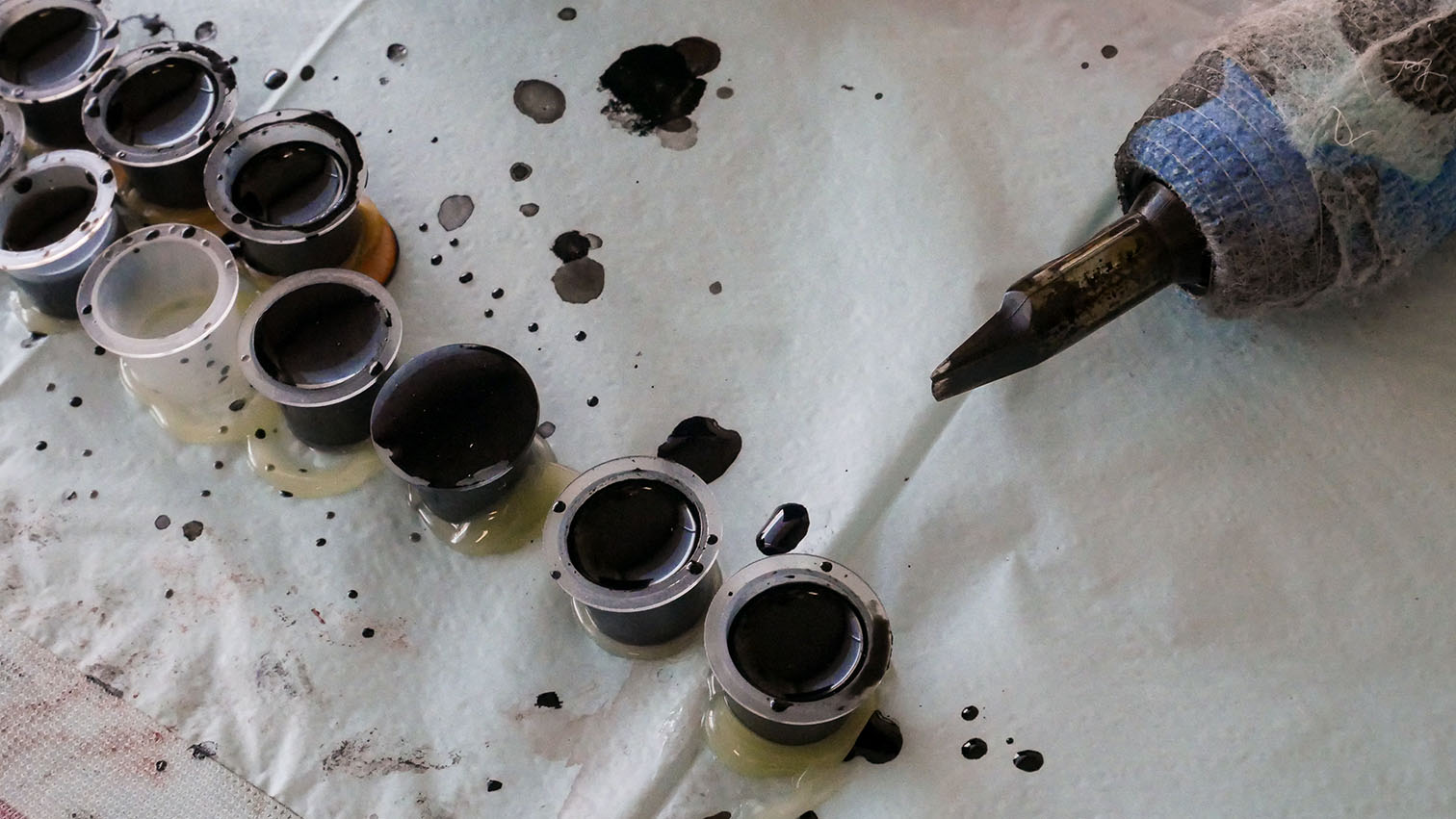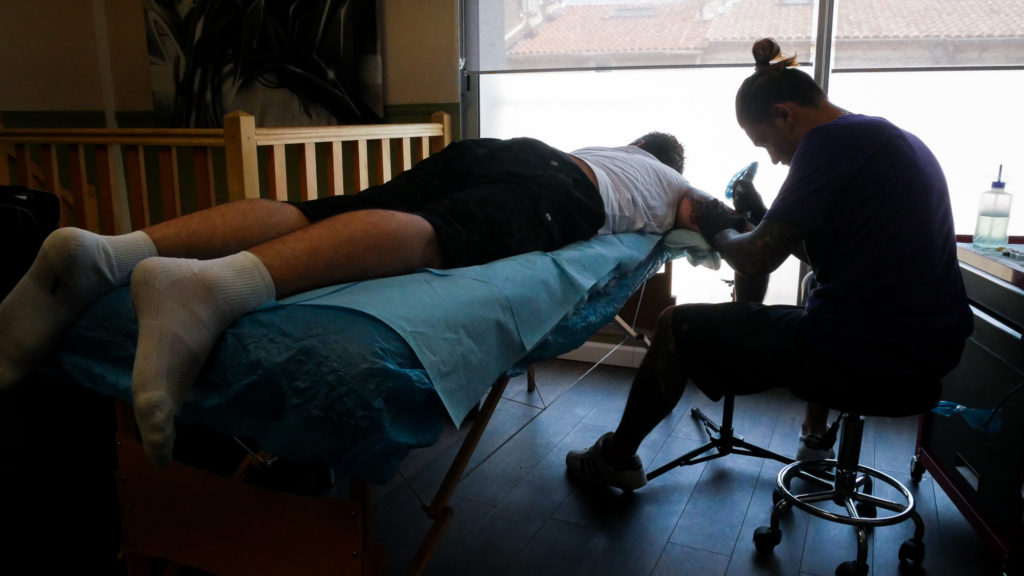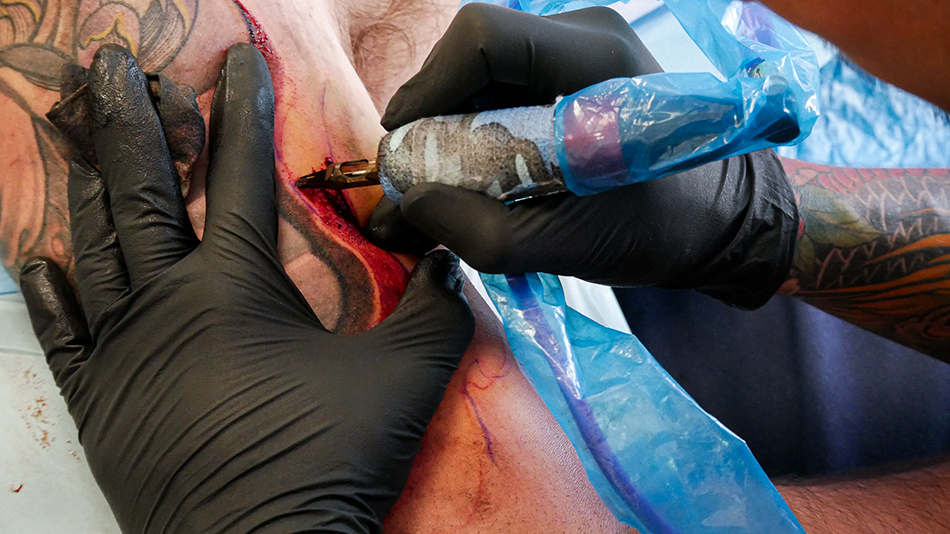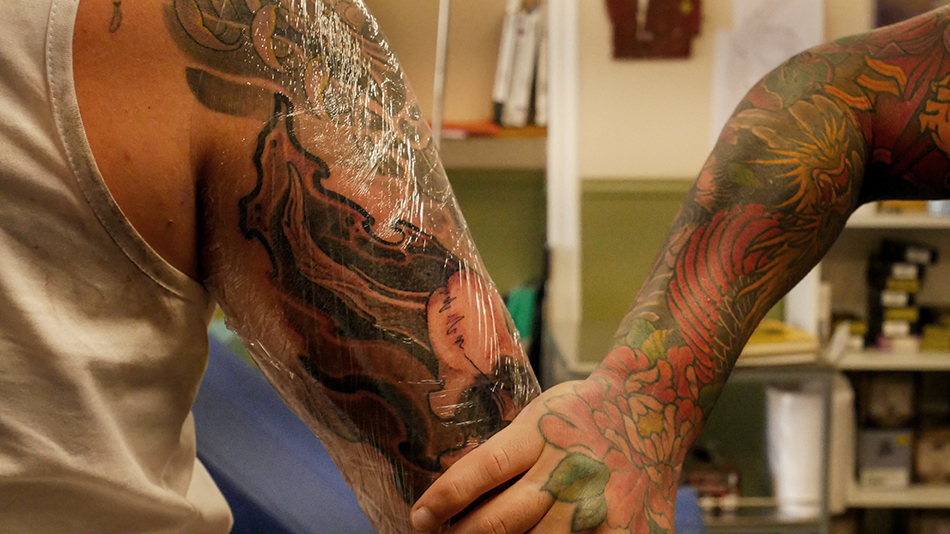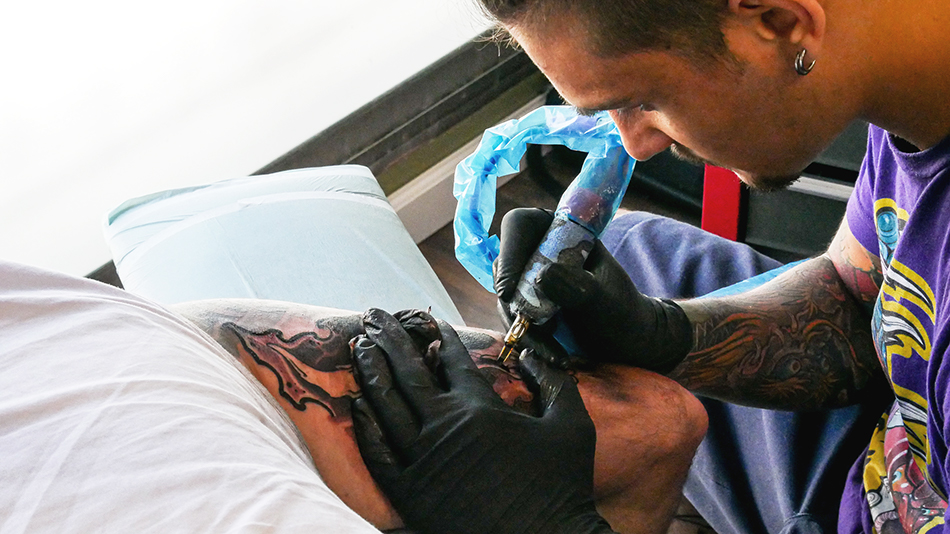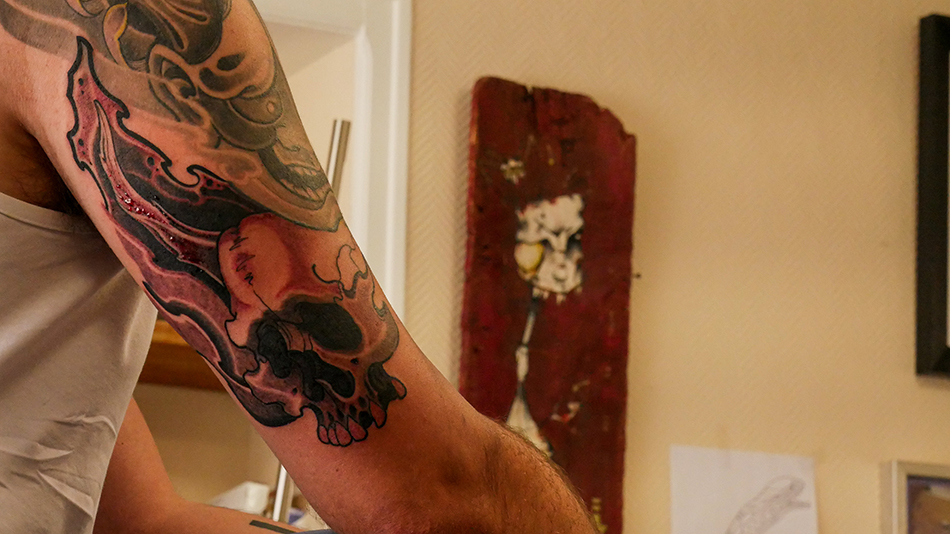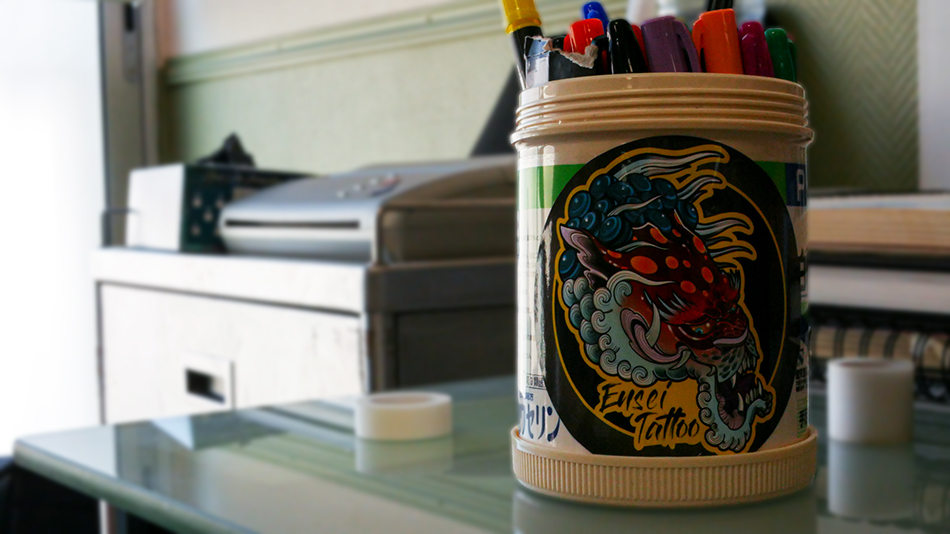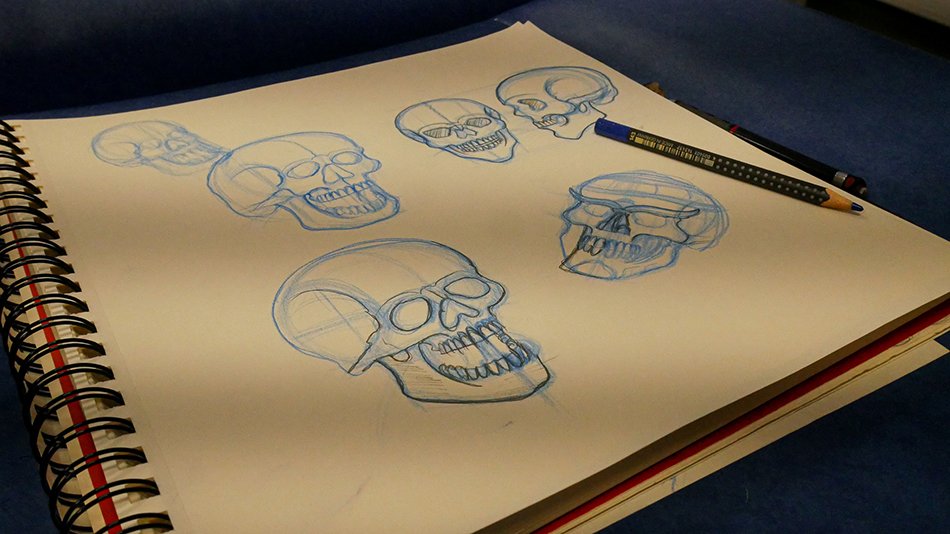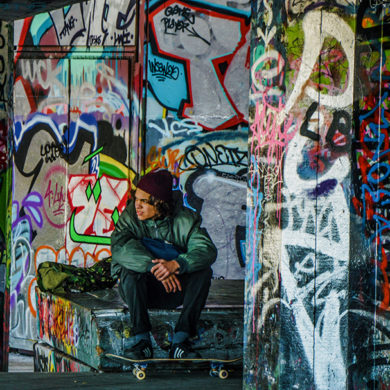While the campaign to save tattoo in Japan continues, why does a foreign tattoo artist decide to practice his art in a country where tattoo is taboo?
It’s warm in Versus Tattoo studio today, almost 40° outside in Morières-lès-Avignons, a small city in the South of France. The buzzing sound of the tattooing machine can be heard while metal music is played in the background. The needle is going back and forth, injecting ink under the skin. Ensei’s hand is moving fast, but still carefully drawing the lines of a Japanese demon’s skull that will last forever. Tattooing is a work that requires both skill and talent, it is a rigorous job and Japanese tattooing feels like a marathon. However, in Japan tattoo artists and tattooing do not have any legal recognition and are in a grey area.
Ensei is a French tattoo artist with a particularly interesting story, he has always been interested in Japan and its culture. He learnt a lot about the country from his grandad’s stories, a former naval officer for the French navy, and from Japanese anime and comic books that are really popular in France. During a trip in Japan, Ensei even got tattooed by Japanese tattooist Garyo. That’s only when he got back that he understood that he wanted to become a tattoo artist.
“I was chatting with a friend who told me he went to Japan in order to learn a traditional art. I thought that was a great way to discover Japanese culture and learn a job at the same time” says Ensei. He started thinking about it, not learning sushi-making like his friend obviously. No. Ensei was thinking about learning tattooing. Even though tattooing was not one of his main interest at first, Ensei says that he has always been impressed and kind of attracted by Japanese tattoos. Large tattoos that cover entire parts of the body. Garyo accepted the young French as an apprentice in his tattoo shop in Tokyo, and that’s how Ensei’s tattooing learning trip started.
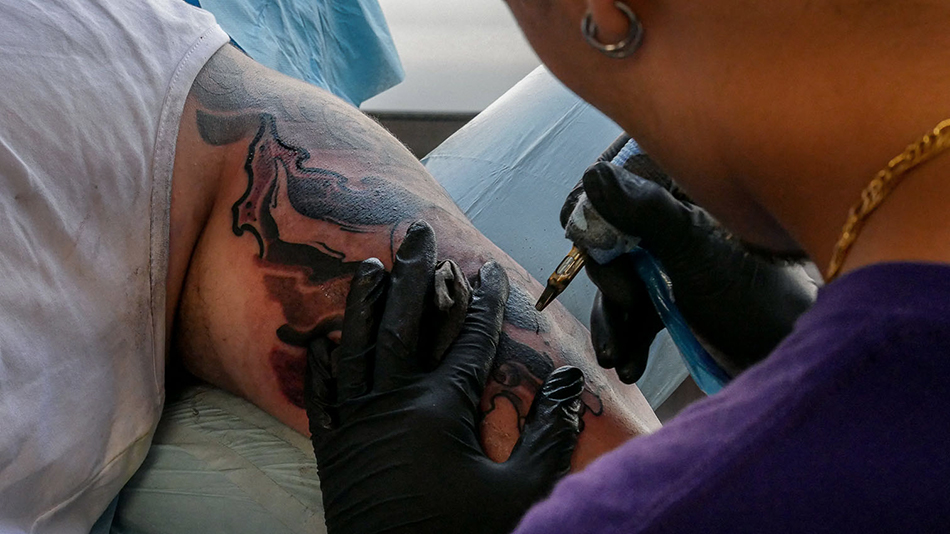
After a few years of practice in Japan, Ensei is now sharing his time between Artemis Studio in Japan and Versus Tattoo Studio in France. But he is also frequently working as a guest in other tattoo shops. Thanks to his experience Ensei knows quite well the difference in perception of tattooing between Japan and Western countries. He has also discovered the difficult reality of being a tattoo artist in Japan as well as a foreigner.
Ensei is finishing drawing the lines of the Japanese demon’s skull. Slowly giving the forms of the teeth and the horns that will be filled with shades of black and withe over the next few hours. Ensei talks about the difference between the Western and the Japanese tattoo culture. Even though tattooing will always require skills, Japanese culture is historically turned toward massive pieces such as full back or sleeves tattoos. Most of the time with heavy symbolic.
When asked about this symbolism, Ensei gives a surprising answer. From his own experience, Japanese people tend not to care much about the different meaning that their tattoos will represent while Western people pay much more attention to these symbols. “This is strange but also an evidence that symbolism can change, even in a country such attached to symbols than Japan” says Dr. Christopher Hood from Cardiff University.
A society turned toward the collective rather than the individual.
Dr. Christopher Hood
As an expert in symbolism in Japan, Dr. Hood explains how Japanese society loves those symbols reflecting itself with for instance the Shinkansen, the Japanese bullet train, which is a symbol of modernity and rigour, but also Samurai who are a symbol of courage and honor. Those massive Japanese tattoos used to be a symbol for the working class and a display of courage as well, showing people were able to handle pain, but over history it became more linked to gangsterism.
“Despite the massive tattoo pieces, if you’re not hanging out with inked people you will barely spot tattoos on the streets of Japan” says Ensei. Dr. Hood confirms and goes further explaining how invisible tattoo shops seem to be in Japan. He says “Here in Cardiff of in the U.K. in general you will almost find tattoo shop at any street corner but in Japan, I’m sure you can walk for hours in Tokyo without really spotting any”. And a difference also has to be made between a tattoo shop, which often will be hard to spot from the streets and more private studios for which you will need to be introduced to. Those artists are often working on the traditional form of Japanese tattooing which is called Tebori.
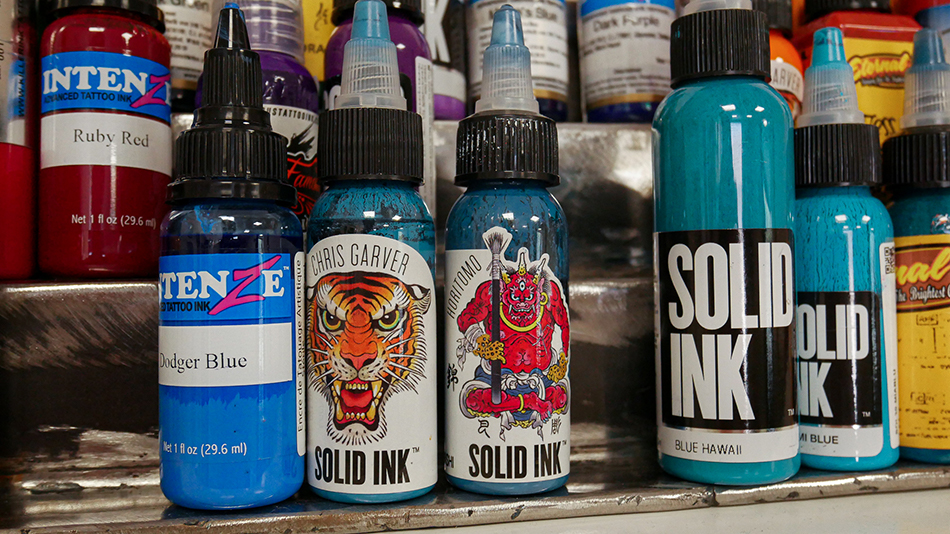
“This is important to understand that Japan is a society which is really turned toward the collective rather than the individual” says Dr. Hood and people with tattoos are seen like out of the norm in that society. Ensei has the same overview when he talks about his life in Japan and he goes further saying “whatever you’re observing in Japan, transportation, people, jobs, everything has to fall into line. That’s why people with tattoo and tattoo artists might be in this grey area of people not into the norm of Japanese society”.
As he is getting the larger needle and the ink ready for the filling, Ensei asks his client if he needs a break. Sometimes long tattooing sessions can be difficult to handle. Five minutes break will be enough today, just the time to have a glass of water and relaxing the arm before getting back to the job. While the needle starts buzzing, the conversation with his client and his colleague is switching on his life in Japan. The three of them have been there, either for work or travel. Today’s client even got his first tattoo from Ensei during a visit in Tokyo a few years ago and he really liked his work. From the discussion, being in Japan seems much easier for tourists than for foreigners seeking for a job. As in many countries, it seems like people think that foreigners come to “steal their job”.
People were almost running away as soon as I said I was a tattoo artist.
Ensei
However, as a Western foreigner, and French especially, Ensei explains that life should usually be easy. “When you’re French it’s often good to be in Japan. To make friends and meet people. Japanese love French culture and they are really curious” says Ensei, “but for me, people were almost running away as soon as I said I was a tattoo artist”. Ensei knew that having tattoos was not probably the best choice to live in Japan, but being a tattoo artist is even worse.
People tend to still associate tattoos, and especially Japanese ones to Yakuza and they tend to keep away from tattoo artists and inked people” says Ensei. In Japan, tattooer do not seem to be recognized as artists even though people actually recognize the beauty of their drawings. “Tattooing in Japan is a really grey area. That’s what happened with Seiki Masuda, our savior maybe. His case could become a jurisprudence and put tattooing out of trouble in the whole country.”
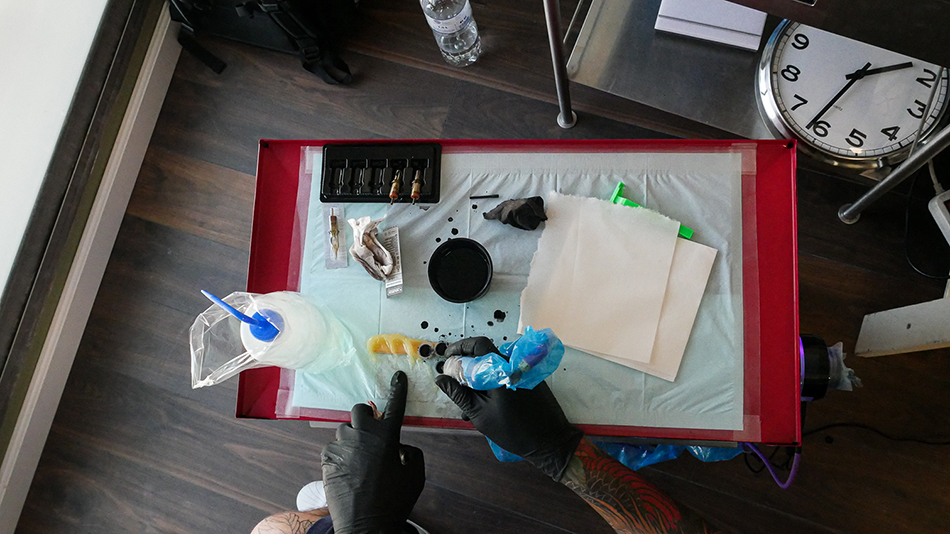
Because of this grey area, tattooing is not really illegal but at risk, depending on the governing authorities. In Osaka, a place where both tattooing and the yakuza have a long history, the rules about tattooing have been reinforced over the last few years. Taiki Masuda, a Japanese and Osaka-based tattoo artist, has been sued in 2017 for practicing without medical license. However, the young tattoo artist decided to not pay the fine and to stand out for tattooing in Japan in order to get the practice recognized as an art and not as a medical practice.
If the Osaka local authorities have been able to sue Masuda, this is because they decided to use an almost forgotten 2001 law in order to prevent him from practicing. A law stating that the insertion of a needle and ink under the skin is considered as a medical or surgical practice, logically needing a medical license. This is how grey the tattoo practice has become in Japan.
…tattooing will probably be forbidden, and we will have to hide.
Ensei
“The final decision in Taiki Masuda’s case might decide of the whole situation of the practice in Japan” says Ensei, “If he loses his trial, tattooing will probably be forbidden, and we will have to hide”. Clandestinity would become tattooists’ refuge. However, a win for Masuda wouldn’t make tattooing legal either, it would just state that tattooing is not a medical practice as it is. “Tattoo will still not be popular, but we would feel a bit better with the law, less at risk” says Ensei. The decision has finally been made by the high court stating that Masuda was right, maybe an important win for tattooing in Japan.
If this decision has given more exposure to tattooing over the last years and has shown that some people are fighting for this art, the way it is perceived might not change easily. Ensei admits he does not have many Japanese clients at Artemis Studio, “about 99%” of his clients in Tokyo are Western people he says. Ensei adds that amongst the Japanese people he tattoos, most of them are girls.
However, this comes from his own choice. Ensei prefers not to have to ink too many Japanese men in order not to be associated to the Yakuza. “The situation is already difficult enough like that” he says laughing. “Most of the Japanese people I inked were friends of mine or friends of my friends” says Ensei, “it allows us to avoid contact with suspicious people”. But as he said “it’s also thanks to the Yakuza that this tattooing culture is still alive”.
So the Japanese people that Ensei is tattooing are mainly musicians, artists, but also people from a kind of alternative Japan like strippers, porn actors, and bartenders. “Because in Japan they’re almost the only people to come toward tattoo artists” he says. He even goes further and details who his circle of friends in Japan is composed of. “Mainly the same kind of people, because they part of those people who don’t see anything bad in tattoos” says Ensei, “they are already kind of out of this society : my martial art coach for instance but also musicians, artists or even people from the porn industry”. The surprising thing is when Ensei explains that, as the son of a police officer in France, this is totally not the kind of people he’s used to hang out with.
This issue about the tattoo culture in Japan has been brought on the table more and more frequently over the last few months because of the approaching 2019 Rugby Worldcup and 2020 Olympics that are going to take place in Japan. This has been brought up as a discrimination issue for tourists coming to discover the country, often forgetting the social issues for the people, both Japanese and foreigners, living in the country. If the government is trying to push public facilities to accept tattooed people, Ensei thinks these events will not change anything. “Japan is stuck between modernity and traditions, I feel like people will just end up repeating the same behavior toward tattoos than their parents used to do with them” he says.
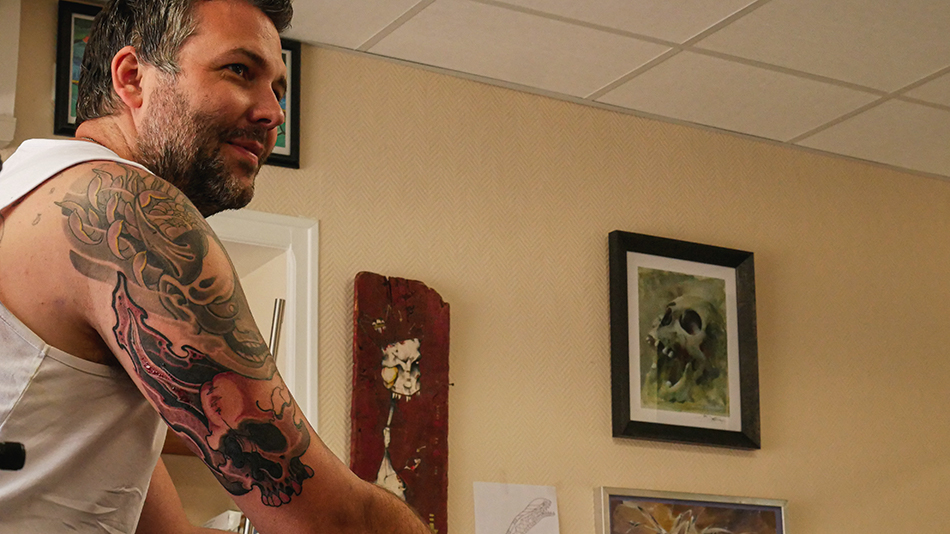
Even though rugby stars such as the All Blacks will be seen in the streets of Japan with their massive Maori tattoos, this might not change the overview of tattoos in the major part of the Japanese society. “I really don’t see any opening to tattooing, for instance for the Worldcup they ask the rugby-men to hide their tattoos, I don’t see any evolution” says Ensei. On his side, Dr. Hood agrees and says that despite the world famous athletes who are playing or traveling in Japan, nothing has really changed yet. “Probably because they’re not the good people to have tattoos. This would probably need important Japanese athletes or celebrities to have a tattoo in order to finally make things change” Dr. Hood says.
…most probably being members or former members of Yakuza.
Dr. Christopher Hood
However, despite his understanding of the Japanese society and the issue of tattooing, Dr. Hood has never really witnessed the tattoo ban and says he’s used to see people with tattoos in onsen, with some of them “most probably being members or former members of Yakuza”, he says. “I think this is also an easy way for onsen, izakaya and ryokan owners to avoid problems in general” says Dr. Hood, “it’s way easier to ban all tattoos from your business than trying to spot people who might be troublemakers and who often are associated to tattooed people in Japan nowadays”. Christopher Hood even supports his hypothesis by questioning the link between Yakuza and a white foreigner having tattoos. “How many foreigner, particularly white foreigners, are member of the yakuza? I’m guessing it’s close to zero” he says.
It’s almost been 5 hours in the tattoo studio. The needles have stopped a few minutes ago and Ensei is now analysing his work with his customer before covering the tattoo with hygienic plastic. The tattoo has to stay protected from dust and any other kind of foreign body. In a few weeks, after summer, Ensei will get back to Japan and get back to his life as a foreign tattoo artist in Japan. Before that he’s been invited as a guest tattooist in Paris and in Italy. If his talent is recognised in Europe, there is still a long way to go before being recognised as an artist in Japan, his adoption country.
